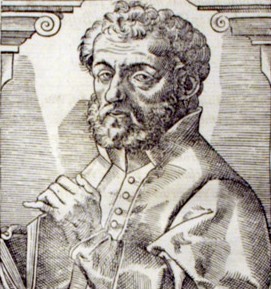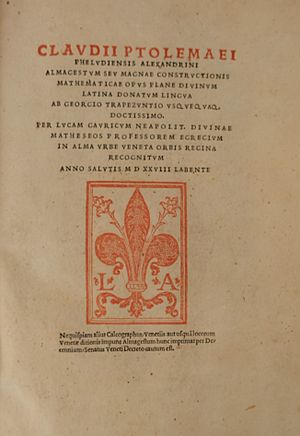George of Trebizond facts for kids
Quick facts for kids
George of Trebizond
|
|
|---|---|
| Γεώργιος Τραπεζούντιος | |
 |
|
| Born | 1395 |
| Died | 1486 |
George of Trebizond (born 1395, died 1486) was a smart Greek thinker and writer. He was a humanist, which means he studied and taught about ancient Greek and Roman ideas. He lived during the time of the Renaissance, a period of great learning and art.
Contents
Life of George of Trebizond
George was born on the Greek island of Crete in 1395. At that time, Crete was a colony of Venice, a powerful Italian city. His last name, Trapezuntius, came from his family's roots in the Byzantine Greek Trapezuntine Empire.
Moving to Italy
It's not fully clear when George first went to Italy. Some say he was asked to come to Venice around 1430. He might have worked there as an amanuensis, which is someone who writes down what another person says. Others believe he visited Italy later, during the Council of Florence (1438–1439).
Learning and Teaching
In Italy, George quickly learned Latin from a famous teacher named Vittorino da Feltre. He learned so fast that in just three years, he was able to teach Latin writing and rhetoric. Rhetoric is the art of speaking or writing effectively.
His skill as a teacher grew, and he became well-known for translating the works of Aristotle. Aristotle was a very important ancient Greek philosopher.
Working for the Pope
George was chosen to be a secretary for Pope Nicholas V. The Pope greatly admired Aristotle's ideas. However, George also strongly criticized another famous Greek philosopher, Plato.
George wrote a book in 1458 where he compared Aristotle and Plato. Some historians called this book a "remarkable mixture of learning and lunacy." His strong opinions and some quick, not-so-accurate translations made his reputation as a scholar suffer.
Later Years and Legacy
Because of the strong feelings against his work, George might have had to leave Italy. But Alfonso V of Aragon, a king, offered him protection in Naples.
Later, George returned to Rome. In 1471, he published a very successful Latin grammar book. This book helped people learn Latin rules. He also wrote an earlier work about Greek speaking principles, which was highly praised. Even his critics admitted he was brilliant.
George of Trebizond died in Rome in 1486, living in poverty. His son, Andrea of Trebizond, also became a scholar and translator.

Works of George of Trebizond
George wrote many books and translated many ancient texts. Here are a few of his important works:
- Rhetoricorum libri V.: This book was about the art of speaking and writing well.
- Isagoge dialectica.: This work focused on logic and reasoning.
- De artificio Ciceronianae orationis pro Quinto Ligario.: This book looked at the speaking style of the famous Roman orator Cicero.
- Rhetoricorum.: This was his translation of Aristotle's book on rhetoric.
He translated many works from Greek into Latin, including writings by Plato, Aristotle, and early Christian leaders known as the Church Fathers. He also wrote his own essays in Greek and Latin about grammar and rhetoric.
See also
 In Spanish: Jorge de Trebisonda para niños
In Spanish: Jorge de Trebisonda para niños
 | Jewel Prestage |
 | Ella Baker |
 | Fannie Lou Hamer |

